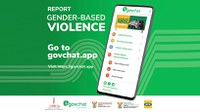
GovChat, Women in ICT Forum intro online GBV platform

The platform’s launch coincides with this year’s International Women’s Day, which is commemorated every year on 8 March.
In South Africa, GBV and femicide have been declared a second pandemic, which the event’s programme director, Vuyolwethu Dubese, pointed to in her opening remarks.
Dubese cited that in 2019/2020, a woman in South Africa was murdered every three hours, and femicide is five times higher in SA than the global average, with the country having the fourth-highest female inter-personal violence death rate out 183 countries listed by the World Health Organisation in 2016.
Chairperson of the South African Women in ICT ForumSonwabise Mzinyathi explained that the platform is the culmination of multi-stakeholder engagements centred on fighting GBV and using the strength of technology to fight social ills.
“Together with GovChat, we went on a journey to develop this platform. We debated amongst ourselves whether it should be an app, but resolved that it should be an interactive online engagement platform.
“We wanted to make sure the platform can be ever-evolving, we can always innovate upon it and for it to always be constantly available to be updated with insights and information at any given moment.”
Described as a solution that uses the power of data and analytics to curb the systematic problem of GBV, the platform will allow South African citizens to report incidents of gender-based violence, rate a safe space, as well as access contact details when in need of help.
The platform is a zero-rated “progressive” Web-based application, said Archana Arakkal, data specialist at GovChat.
This, according to Arakkal, means it is not a traditional Android or iOS app. It is a URL link that can be accessed via Google Chrome or any other browser, she stated. “This can either be on a desktop Web site or a normal standard smartphone, as long as you have a browser interface. We’ve tried to keep it as accessible to as many community members as possible.”
In building the GBV platform, Arakkal said there were a few concerns they had to keep top of mind.
“We are hoping to build this platform as we go,” Arakkal stated. “Some of the core capabilities that we needed to ensure was having a real-time reporting capability, ensuring data privacy and security is still maintained, although we are gathering data.
“To ensure we are keeping track of data privacy and security standards, we are following SARB regulations, which are essentially the same regulation standards that we use for the financial sector.
“All data that is gathered on this platform is anonymised and all personal identifiable information is stripped out of the platform. We are aggregating all the data in order to ensure we are capturing all the information we need without exposing any information.”
Soul City Institute CEO Phinah Kodisang noted technology can be an enabler and can also be limiting, particularly if it’s not used correctly or made accessible to every woman.
Not everybody has access to a cellphone, and if they do, not everybody has access to data – South African data prices are among the highest, she stated.
“As we push technology forward, we must actually push #DataMustFall because we can’t have technology that we want to put in women’s hands but it’s limited by the fact that they don’t have resources.
“Women, especially black women, are the face of poverty in our country. You want to introduce something that will be an enabler and will help them fight gender-based violence, but you might be limiting the fight if you are not providing all the resources and balancing the inequalities that exist in our society.
“Let us take into cognisance that not all women have resources – there’s inequality. We need to be equitable in our response, making sure women all over South Africa have access these resources.”
GovChat CEO Eldrid Jordaan revealed the official government citizen engagement platform has well over five million South African users, accessing government services such as those of the Department of Social Development (DSD), healthcare and engaging with over 257 municipalities.
“The [GBV] platform is based on loyalty and trust, and we’ll make sure the exact same process we’ve followed with the DSD, the Department of Health and Cogta…we are going to ensure South African citizens that are in distress and are in need get help.”
